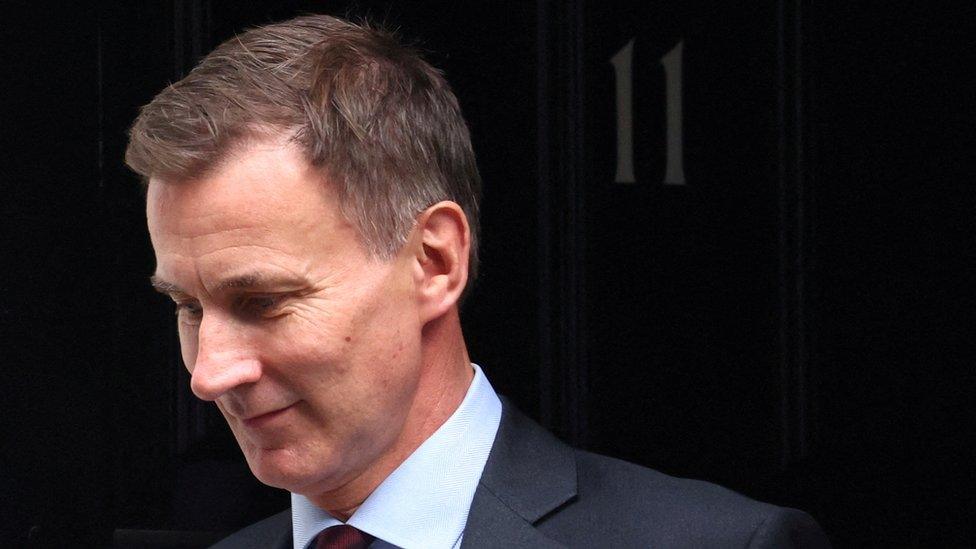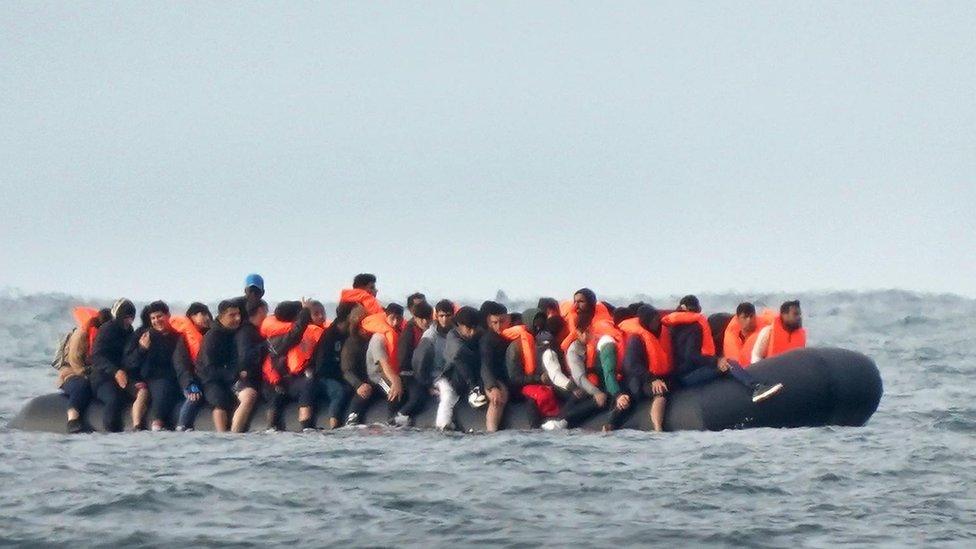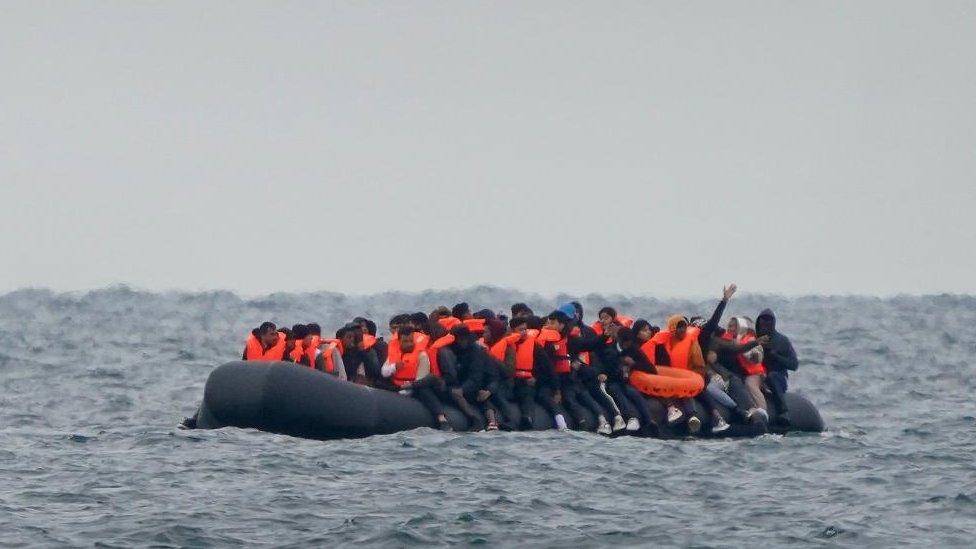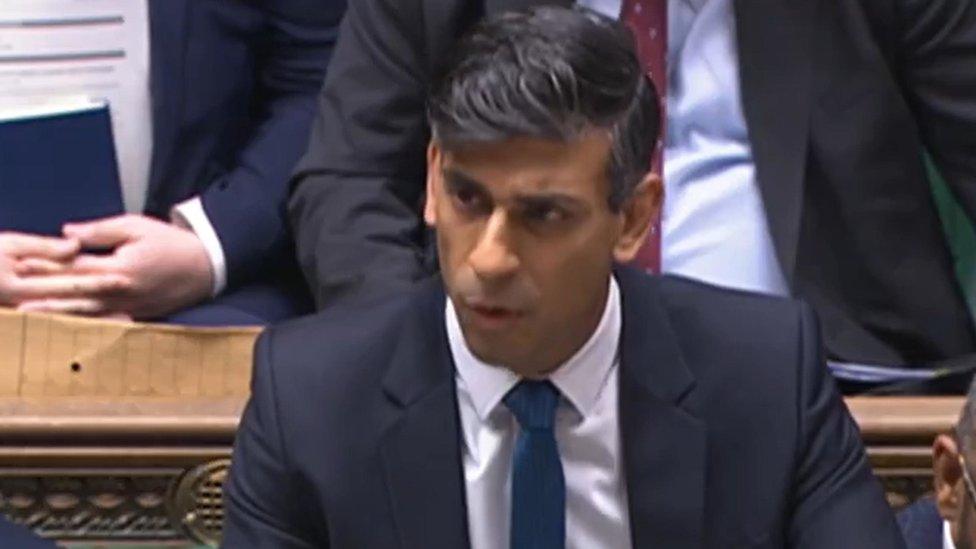Rwanda flights: Jeremy Hunt says they may not take off next year
- Published

The chancellor has said that flights taking asylum seekers to Rwanda may not start next year.
Prime Minister Rishi Sunak has targeted next spring for the first departures but Jeremy Hunt said he could not "guarantee" that deportations would begin in 2024.
It comes as an ex-Supreme Court justice described measures aiming to revive the plan as "profoundly discreditable".
The flagship policy was ruled unlawful by the Supreme Court on Wednesday.
The government has said it will use emergency laws to allow flights to take off but questions have been raised about whether there will be time for approval of the plan before the next general election.
Speaking on Thursday, Mr Hunt said: "We are hopeful that because of the solutions that the prime minister announced yesterday [Wednesday] we will be able to get flights off to Rwanda next year."
But, he added: "We can't guarantee that.
"We have to pass legislation, emergency legislation, in the House of Commons (and) we have to sign a new international treaty with Rwanda."
Watch: Amol Rajan quizzes James Cleverly on Today: 'I can go and get a cup of tea'
Earlier, Home Secretary James Cleverly told the BBC the government was in the "final stages" of agreeing the new treaty with Rwanda.
Asked for a timescale of when flights would take off, Mr Cleverly said: "We are working to make sure we can do that some time in the new year. We're keeping to the timescale we originally proposed."
He claimed MPs could vote to approve the treaty once it was agreed and pass new laws within days.
But, speaking later on Thursday, the prime minister's official spokesperson appeared to shift the timeframe, saying emergency legislation would be brought forward "in the coming weeks".
He said they wanted to do it as soon as possible, adding that the legislation would prevent "systemic challenges" being brought to try to question the policy before British courts.
Many are already anticipating the new treaty will be challenged in the courts and Tory MPs will be demanding more detail on how the government thinks it can bypass human rights laws and international conventions.
Mr Hunt described the Supreme Court ruling as a "setback", but said ministers "would not allow anything to get in the way of delivering the prime minister's pledge" to put a stop to small boats of migrants crossing the Channel.
Earlier, Mr Cleverly did not deny previously describing the policy as "batshit", as he defended the planned use of emergency laws to get planes off the ground.
Former Supreme Court Justice Lord Sumption said such a move "won't make any difference", after the Supreme Court ruling.
Mr Cleverly disagreed with the criticism and said a new treaty with Rwanda would allow flights to depart.
In their ruling on Wednesday, the Supreme Court justices said there were "substantial grounds" to believe the Rwandan government could deport people sent to the country to places where they would be unsafe.
They said Rwanda had entered into the agreement in "good faith" but the evidence cast doubt on its "practical ability to fulfil its assurances, at least in the short term," to fix deficiencies in its asylum system and see through changes in procedure, understanding and culture which were needed.
Doris Uwicyeza Picard, adviser to Rwanda's justice minister, told BBC's Newsday that Rwanda's government was offended by the judgement.
She pointed out that it was already hosting more than 130,000 refugees and had been commended by international organisations, including the UN, over the years for their treatment of refugees and guarantee of safety.
After the ruling, Mr Sunak rejected calls to drop the plans and said he was working on a new treaty that would prevent genuine refugees from being sent back to where they had fled from.
Facing pressure from Tory MPs on the right of his party, the prime minister promised to "do what is necessary" to enact the Rwanda policy, including changing UK laws.
The Supreme Court made it clear in its judgement that domestic legislation, as well as international treaties, were relevant to its decision to rule the Rwanda scheme unlawful.
With a general election expected next year, time is running out to change laws and pass legislation, which can take months.
The home secretary said he did not remember privately ridiculing the government's Rwanda policy.
Lord Sumption, a former justice of the Supreme Court, told The Today Podcast on BBC Sounds the "profoundly discreditable" plan to use a law to declare Rwanda as safe was "constitutionally really quite extraordinary".
He argued it would "effectively overrule a decision on the facts, on the evidence, by the highest court in the land".
"I've never heard of a situation in which parliament intervenes to declare the facts - the safety or unsafety of Rwanda - to change the facts from those that have been declared by the courts to be correct," he said.
"The courts have perused hundreds of pages of documents to reach this decision. For Parliament simply to say the facts are different would be constitutionally really quite extraordinary."
The prime minister is facing calls to withdraw the UK from the European Convention on Human Rights (ECHR), an international treaty.
Mr Cleverly played down the possibility of the UK leaving the ECHR, which ensures human rights cases can be heard at the European Court of Human Rights in Strasbourg, France.
The first Rwanda flight was scheduled to depart in June 2022 but was cancelled after an intervention from the European Court of Human Rights.
When asked if the government was prepared to leave the ECHR treaty, Mr Cleverly replied: "I don't believe that will be necessary. I believe we can act in accordance with international law and we are very determined to do that."
Related topics
- Published16 November 2023

- Published15 November 2023

- Published15 November 2023
